종목토론카테고리
게시판버튼
게시글 제목
동부제철 연구해본결과 내년 국내 3위권 진입 이네요게시글 내용
내년도 국내3위 철강사 문제 없을듯. 동국제강 제끼네요 동부제철이 실적도 좋코
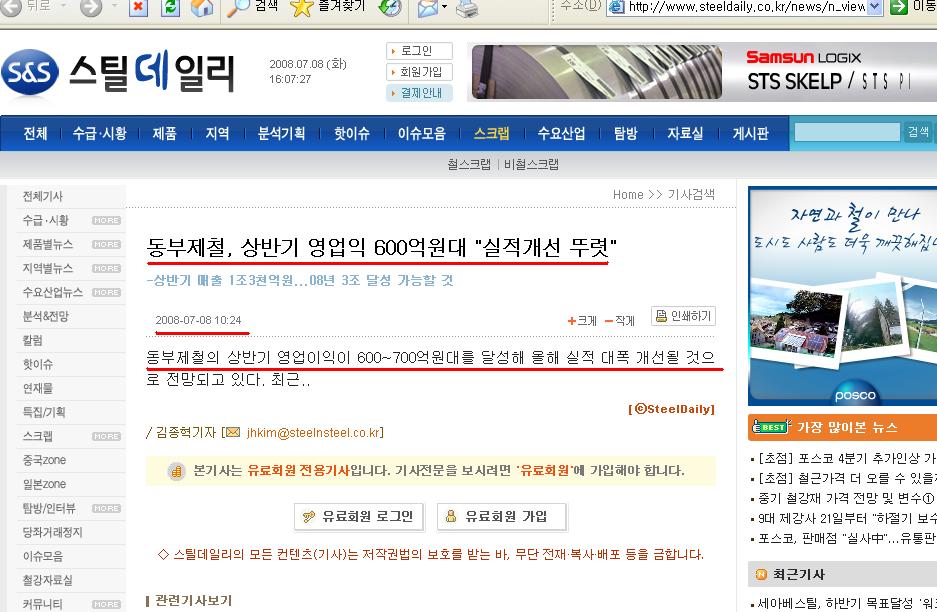
미국 뉴커(Nucor)사가 90년대에 상용화에 성공한 전기로로 당시에 위험부담이 큰 전기로를 뉴커사가 도입하는 것에 대하여 모두들 위험하다 말했지만, 결과적으로 뉴커사가 미국내 경쟁사를 모두 몰락시킨 전기로 입니다.
미국내 철강회사가 몰락한 이유는 뉴커사가 다니엘리 전기로를 설치 하였기 때문 입니다.
Nearly all of the 215,000 miles of rebar that rolls out of Nucor's West Seattle steel mill each year is used within several hundred miles of the plant, helping support structures ranging from Seattle's Qwest Field to the Tacoma Narrows bridge.
Most of the junked autos, old refrigerators, railcars and other scrap that meet their doom inside Nucor Seattle's 3,200-degree furnace come from the same region.
So, with the Northwest economy firmly in recovery mode and rebar prices almost twice what they were when Nucor bought the plant just over two years ago, these should be gravy days for Doug Jellison, general manager of Nucor Seattle.
And yet, Jellison finds his thoughts turning west ?about 5,432 miles west, to Beijing, China. Because no matter how self-sufficient Nucor Seattle may appear, what happens in booming China has a very real impact on how much steel Jellison's mill makes and how profitably he can sell it.
"The market driver is China, no question about it," he said.
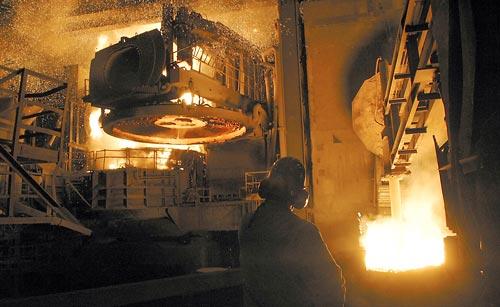 Insatiable demand from China, along with the recovering U.S. economy, has boosted prices for raw industrial commodities across the board. As a result, several Pacific Northwest metals industries ?steel making, aluminum smelting, hard-rock mining for silver, lead and zinc ?have rebounded from their near-comatose state of just a few years ago.
Insatiable demand from China, along with the recovering U.S. economy, has boosted prices for raw industrial commodities across the board. As a result, several Pacific Northwest metals industries ?steel making, aluminum smelting, hard-rock mining for silver, lead and zinc ?have rebounded from their near-comatose state of just a few years ago.
But as other industries have learned, China can be a competitor as well as a customer. In recent months, China has begun exporting spare rebar to the United States, pushing down prices and prompting production cutbacks at producers such as the Nucor Seattle plant. In aluminum, China's production capacity nearly tripled between 1995 and 2003, reshaping the global market.
Prices for many metals remain at or near historic highs, despite some recent slippage. But high prices alone can't guarantee healthy metals industries, in the Northwest or anywhere else. Steel mills and aluminum smelters require lots of cheap electricity, and the Bush administration's recent proposal to raise Bonneville Power Administration rates sent industry and government leaders scrambling to block it. And if U.S. industrial production falters, so will metals demand.
Role in Northwest history
Though largely overshadowed by timber, aerospace and, most recently, high technology, metals ?precious and otherwise ?have played key roles in Northwest history.
A series of gold rushes in the 1860s lured miners to what would become Idaho; the Panhandle's Silver Valley has produced billions of dollars worth of silver, lead, zinc and other metals.
The West Seattle mill now owned by Nucor will mark its 100th anniversary in May; it was started by William Pigott, who also founded Paccar. After the Columbia River dams were built, aluminum smelters ?attracted by rock-bottom electricity ?sprouted across the region.
More recently, though, a combination of slack demand, low commodity prices and higher electricity rates combined to dull metals' luster. Mines and smelters shut down; steel was replaced by silicon in the public consciousness.
But the past 18 months have been a boom time for metal producers. On the London Metals Exchange, aluminum futures are up 39.5 percent since October 2003; zinc is up 68.5 percent, lead 74.4 percent and copper a whopping 82 percent.
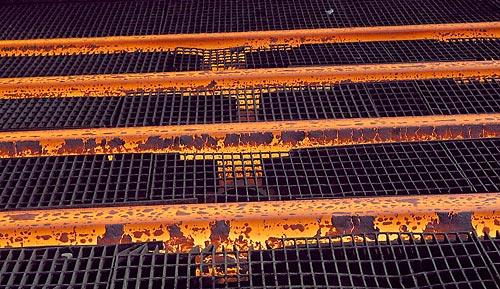 Manufactured steel products have shared in the boom. According to Purchasing, a Newton, Mass.-based journal for industrial-purchasing managers, the spot price for hot-rolled steel sheet ?an industry benchmark ?has more than doubled since October 2003, from $295 a ton to $600.
Manufactured steel products have shared in the boom. According to Purchasing, a Newton, Mass.-based journal for industrial-purchasing managers, the spot price for hot-rolled steel sheet ?an industry benchmark ?has more than doubled since October 2003, from $295 a ton to $600.
Whatever the metal, the same basic factors are behind the double-digit increases, said Tom Stundza, Purchasing's executive editor: a reviving U.S. economy demanding the same goods that China already had been eagerly snapping up.
"China's economy has been on this insane building boom," Stundza said. "They're trying to electrify the country, so they've been sucking up every bit of copper they can get their hands on.
"They've got an Olympics coming up in 2008, and they're trying to industrialize their country so that when people come to visit they don't see a Third World country."
Metals producers in the Northwest have responded to the higher prices:
- This past December Alcoa resumed production at its Wenatchee aluminum smelter, idle since July 2001. Even though only two of the smelter's four remaining potlines have been restarted, Alcoa's action doubled the number of active smelters in Washington state.
- Oregon Steel Mills is planning to build a new pipe-making facility next to its existing rolling mill in Portland.
- Nucor is considering several locations in the Northwest ?including West Seattle ?for a new sheet-steel plant.
- Formation Capital of Vancouver, B.C., last month raised $10 million, and said it would use the money to complete permitting and feasibility studies of its huge cobalt property in central Idaho. Cobalt is used to strengthen steel for high-speed cutting tools; the Formation property would be the only cobalt mine in the United States.
Continued demand key
Much of all this activity, though, depends on continued demand to absorb the supplies of new metals and support current price levels.
For example, China is expected to consume about 350 million tons of steel this year, Nucor's Jellison said ?more than a third of the world supply. But since last summer, China's leaders also have been trying to rein in the country's galloping economy.
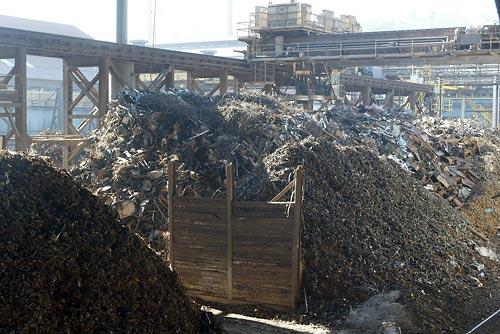 If the consumption forecast is off by less than 10 percent, Jellison noted, "that means another 30 million tons of steel are heading to the United States, and that can make the difference between making money and losing money."
If the consumption forecast is off by less than 10 percent, Jellison noted, "that means another 30 million tons of steel are heading to the United States, and that can make the difference between making money and losing money."
Spot prices for various steel products, which started rising in late 2003, peaked last summer and have been mostly flat to slightly lower since, according to Purchasing data. Aluminum, lead and other industrial metals have followed similar patterns, though zinc is still rising strongly.
And then there's the prospect of competing against the Chinese industrial colossus, rather than merely supplying it.
Over the past several years, China has used a good share of its steel imports to build steel mills of its own; it is now the world's largest steel producer, churning out about 270 million tons last year.
But while China still is buying all the steel sheet and plate it can find, it began exporting other products late last year. In November and December, Purchasing's Stundza said, China exported a million tons of steel ?mostly rebar and light structural steel.
The impact was felt quickly: As West Coast supplies rose, rebar prices ?which peaked at about $550 a ton in August ?began to drop; they run about $470 a ton today. Nucor Seattle cut back output: In the fourth quarter of 2004, the plant's total tonnage was 28 percent below the level set the first nine months of the year.
"A year ago, everything was in short supply and everything was going up in price," Jellison said. "Now it's a lot more variable ?some products, like plate, are still in short supply, but less so for rebar. All the capacity they built is catching up with them."
Another issue for minimills such as Nucor's is the rising price of scrap steel.
Two years ago, a ton of scrap cost about $139; today, that ton fetches $305 (though prices have dropped by nearly a third since their peak in November). A big reason: Increased demand from China for the world's junked cars and broken machinery as feedstock for all those new minimills.
Strong aluminum market
Chinese demand ?along with an upturn in the aerospace, commercial vehicle and construction industries ?has also contributed to the runup in prices of aluminum and alumina, the intermediate product that is smelted into finished aluminum.
As China's construction boom has absorbed much of the world's available aluminum, the country's own production has more than tripled ?from 1.26 million metric tons in 1993 to 6.6 million metric tons last year, according to James F. King, a British industrial-metals consultant.
China's imports soar
Over the same period, China's alumina imports have soared from 951,000 metric tons to 6.3 million metric tons.
The stronger aluminum market, along with a new labor contract and guaranteed power from the Chelan County Public Utility District, helped Alcoa decide to restart its Wenatchee smelter. The plant, which employs 400 workers, will produce 85,000 metric tons of aluminum this year.
But the Northwest's aluminum industry ?what's left of it, anyway ?remains vulnerable to energy prices. Soaring energy costs earlier this decade combined with falling demand during the recession to shut down almost all the region's smelters; only three, in Wenatchee, Ferndale and Columbia Falls, Mont., are operating today, all at reduced capacity.
Alcoa, like Nucor, is watching carefully the Bush administration's proposal for BPA to sell its hydropower at close to market rates. A recent report by the Northwest Power and Conservation Council estimated that such a move would raise electricity bills by 39 percent; Northwest politicians from across the political spectrum have moved to block Bush's plan.
But Alcoa isn't putting all, or even most, of its eggs in BPA's basket. In July the Pittsburgh-based company broke ground on a smelter in Iceland, its first new smelter in two decades. When completed in 2007, the plant will be able to produce 322,000 metric tons of aluminum a year.
Central to the decision to build in Iceland, the company says, was an agreement by the national electricity company to build a hydropower project to supply cheap power to the smelter for the next 40 years.
"When you make aluminum, you need long-term, competitively priced energy," company spokesman Kevin Lowery said. "At the end of the day, aluminum is a commodity, and you need to make it in the lowest cost way possible."
|
게시글 찬성/반대
- 0추천
- 0반대
- 첨부파일 :
- 제목_없음555.JPG 동부제철555.jpg
운영배심원의견
운영배심원의견이란
운영배심원(10인 이하)이 의견을 행사할 수 있습니다.
운영배심원 4인이 글 내리기에 의견을 행사하게 되면
해당 글의 추천수와 반대수를 비교하여 반대수가
추천수를 넘어서는 경우에는 해당 글이 블라인드 처리
됩니다.

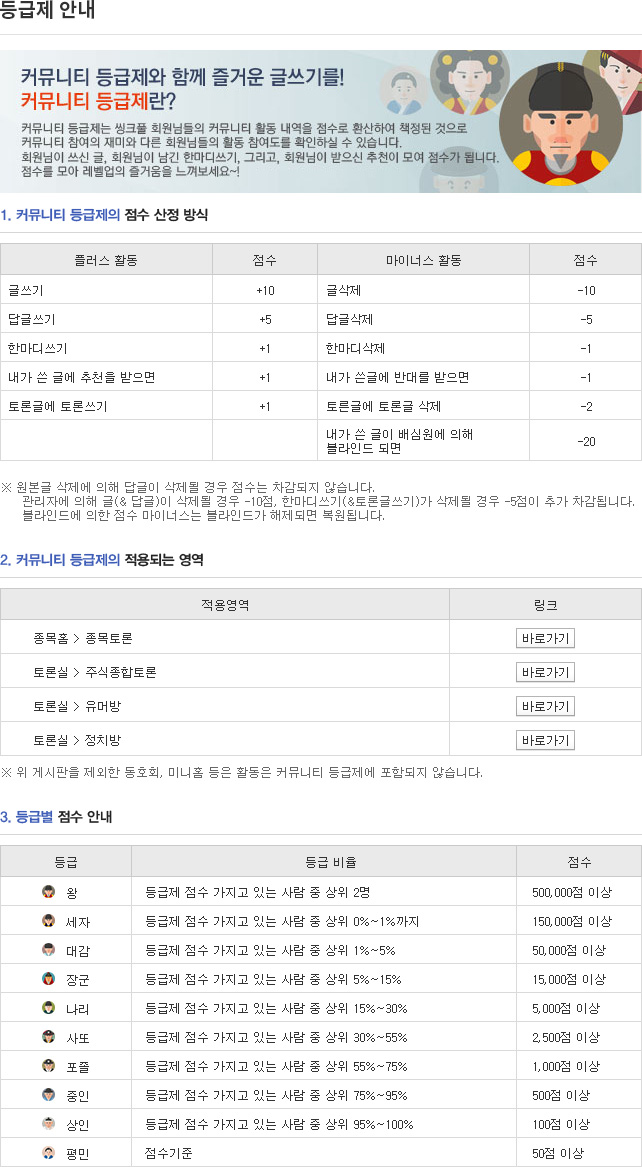





댓글목록